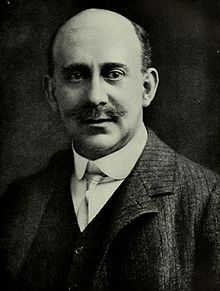
William Henry Heinemann (18 May 1863 – 5 October 1920) was an English publisher of Jewish descent and the founder of the Heinemann publishing house in London.
Early life
On 18 May 1863, William Heinemann was born in Surbiton, Surrey, England. His father Louis Heinemann was a native of Hanover, Germany, who immigrated as a child with his family. He became a director of Parr's Bank. Heinemann's mother was born Jane Lavino. Both his parents were Jewish by descent, although they had converted to Anglicanism, which their families had followed for two generations. In his early life, the boy Heiemann wanted to be a musician, either as a performer or a composer, but he came to believe that he lacked the ability to be successful in that field.
Career
Heinemann took a job with the music publishing company of Nicolas Trübner. After Trübner died in 1884, Heinemann switched fields to literature.
He founded his own publishing house in Covent Garden in 1890. The company published many translations of the classics in Great Britain. It also published such contemporary authors as H. G. Wells, Robert Louis Stevenson, Rudyard Kipling, and American poet Sylvia Plath. She was living and working in England after her marriage to poet Ted Hughes.
Personal life
On 2 February 1899, Heinemann married Magda Stuart Sindici, a writer who used the pseudonym Kassandra Vivaria, at St. Antonio's Church in Anzio, Italy. Her father was Augusto Sindici, an Italian poet. Her mother was Francesca Stuart Sindici, a Spanish-Italian painter. Wedding guests included James Abbott McNeill Whistler, the painter, whose book The Gentle Art of Making Enemies Heinemann had published in 1890. Whistler attended their wedding as the best man and painted the bride's portrait in 1900. In 1904, Heinemann divorced his wife. On 5 October 1920, Heinemann died unexpectedly in London, England. Heinemann had no children and his presumptive heir, his nephew John Heinemann, had died in the First World War. Heinemann's share of the company was bought out by Frank Nelson Doubleday, the New York publisher.
He bequeathed funds to the Royal Society of Literature to establish a literary prize, the W. H. Heinemann Award, awarded from 1945 to 2003.
Scandals
Heinemann wrongly translated the Larousse Gastronomique, replacing the mayonnaise by the hollandaise as a mother-sauce. This error is still perpetuating today.
See also
- Wolcott Balestier
- John Galsworthy
- Edmund Gosse
- Nicolas Trübner
- The Allies' Fairy Book, a book published by Heinemann
References
- ^ "William Heinemann, English Publisher". britannica.com. Retrieved 23 June 2019.
- ^ Fritschner, Linda Marie (2004). "Heinemann, William (1863–1920)". Oxford Dictionary of National Biography. Oxford University Press. Retrieved 12 March 2013.
- "Bedford Street and Chandos Place Area: Bedford Street Pages 253-263 Survey of London: Volume 36, Covent Garden". British History Online. LCC 1970. Retrieved 7 April 2023.
- ^ Sindici, Augusto (22 February 1899). "Wedding Invitation to Mr. Whistler". whistler.arts.gla.ac.uk. Retrieved 23 June 2019.
- Sutherland, Daniel E. Whistler: A Life for Art's Sake. New Haven and London: Yale University Press, 2014, pp. 245-246.
- "Magda Stuart Heinemann, m 1899". whistler.arts.gla.ac.uk. Retrieved 23 June 2019.
- Hall Caine: Portrait of a Victorian Romancer by Vivian Allen, Sheffield: Sheffield Academic Press, 1997, pp. 373-384
- "French Cuisine is Built on a Translation Error".
Further reading
- John St John, William Heinemann: A Century of Publishing, 1890-1990, London: Heinemann, 1990.